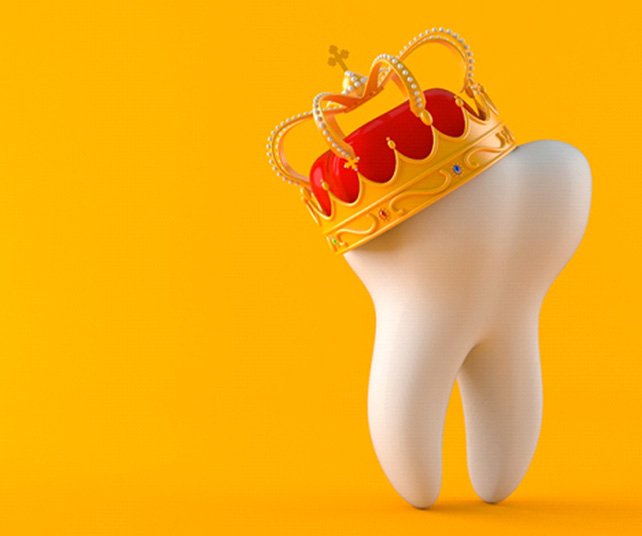Dental Crowns – Little Ferry, NJ
Improve Your Smile with an All-Ceramic Crown
A dental crown is among the top restorative procedures performed every year because it is an effective and successful method to repair a damaged tooth. However, it can also be used along with other procedures, like a dental bridge or root canal therapy. A crown can provide the long-lasting solution you need to maintain a healthy, functional smile. Dr. Peters will create a high-quality restoration that will look just like a natural tooth, so you won't think twice before showing your pearly whites.
Why Choose Erin Dental for Dental Crowns?
- Advanced Technology
- High-quality Materials
- Natural-Looking Results
What is a Dental Crown?

A dental crown is a custom-made cap that's bonded over the surface of a tooth above the gum line. It's most often used in restorative dentistry to repair or rehabilitate a compromised tooth. Modern restorations are made of all-ceramic materials, which allow them to look natural. As a result, crowns also hold a commonplace in cosmetic dentistry because they blend in with real teeth. You can cover various aesthetic flaws, like discoloration or an abnormally shaped tooth. The benefits don't end there. Crowns can also protect a tooth from future damage. Their versatility makes them an excellent solution to help you achieve and maintain your best smile.
The Dental Crown Process

After your initial consultation to create your treatment plan, you'll be scheduled for the first half of your procedure. Dr. Peters will perform any preliminary procedures, such as a root canal, and your tooth is prepped for the restoration. A local anesthetic may be used to keep you comfortable while Dr. Peters reshapes your tooth to allow the crown to fit over it.
Once your tooth has been prepared, she will take an impression of your mouth to get the measurements needed to create your restoration. The mold will be sent to the dental lab, where your restoration is crafted from all-ceramic material to meet your exact specifications. It can take them a couple of weeks, so Dr. Peters will bond a temporary crown over your tooth while you wait.
After your final crown has been sent back to our office, you'll return for your second appointment. The temporary restoration will be removed and your permanent crown will be bonded to your tooth.
The Benefits of Getting a Dental Crown

Crowns have been used for Generations because they offer several benefits, including:
- Natural-Looking Appearance: Ceramic is the go-to material for crowns because it is durable and looks natural. You won't have to worry about a dark restoration blemishing your smile.
- Biocompatible Solution: Ceramic crowns are completely metal free, so there's no risk of allergic reaction. They support your overall health and wellness while improving your smile.
- Long-Lasting Solution: Although ceramic crowns don't contain any metals, they are equally durable. The average lifespan is about 10 years, but it's not unusual for crowns to thrive for much longer.
- Durable: Your crown can withstand the pressure of chewing and daily wear and tear. It will feel like a natural tooth.
If you need a dental crown, Dr. Peters can help. Request an appointment through our website or give us a call at (201) 641-9119.
Dental Crown FAQs

What Are Dental Crowns Made Of?
Dental crowns can be made from a variety of different materials. At Erin Dental, we make our dental crowns out of ceramic. Ceramic is an ideal option because of its natural, tooth-like appearance and durability. They are also ideal for patients who have metal allergies or sensitivities, as ceramic dental crowns are metal-free.
Are Dental Crowns Permanent?
Dental crowns aren’t technically permanent because they will eventually need to be replaced. However, they are a long-term solution. On average, they can protect your teeth for anywhere between 5 and 15 years. When your dentist reshapes your tooth for a crown, the procedure is irreversible, as your tooth enamel cannot grow back. You will always need to have a crown over your tooth. That being said, crowns protect the underlying tooth for much longer than it likely would have survived otherwise. You can keep your crown in good shape by maintaining an excellent oral hygiene routine and seeing your dentist for regular checkups.
How Do You Know When a Dental Crown Needs to Be Replaced?
The only way to know for sure whether or not a crown needs to be replaced is by having it visually examined by your dentist. Here are some of the warning signs that could indicate the need for a new dental crown:
- Pain: If there is decay underneath the crown, the crown needs to be removed and the cavity treated.
- Instability: If your crown feels loose, you should give us a call so it can be addressed.
- Change in Appearance: If the appearance of your crown noticeably changes, it can negatively affect your self-confidence. This is a valid reason to have it replaced.
- Dark Line: If there is a dark line at the base of your porcelain-fused-to-metal crown, this could indicate that your crown has been through some wear and tear. This is a good time to consider having it replaced.
Do Dental Crowns Get Cavities?
It is impossible for a crown itself to develop cavities, but the tooth underneath it still can. Crowned teeth actually have a similar risk of decay as uncrowned teeth. Poor oral hygiene makes it possible for bacteria and plaque to form around the gumline where the tooth meets the crown. They can then travel beneath the crown and cause problems. You can prevent cavities in crowned teeth the same way you do for uncrowned teeth. Brush, floss, and see us for regular checkups.
